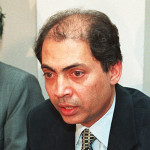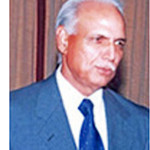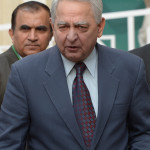The Enforcers
By Adnan Adil | News & Politics | Sport Report | Published 10 years ago
Successive sitting governments have used the country’s anti-corruption institutions to hush up the corruption cases of government high-ups, even while witch-hunting political opponents. Be it the National Accountability Bureau (NAB), or its predecessor, the Ehtesab Bureau, both have, in the past, served as a political tool in the hands of the sitting government.
The office of the chief executive of the accountability body has the power to play a key role in carrying out discriminatory accountability, even the persecution of a particular group. For this purpose, each government appoints its own protégé as the chairman of the accountability organisation, who sees to it that only those graft cases are investigated that suit the rulers, while others are swept under the carpet.
All the governments have framed their accountability laws in such a manner that the chief of the institution holds vast administrative powers so he can dictate terms to his subordinate officers, who have also been selected on the basis of their pliability and connections with the ruling clique. The key to spoil legitimate anti-corruption cases also lies with the investigation agency, which can delay the process and prick holes in the evidence so that the accused is let off the hook.
Before the formation of the NAB in 1999, governments selected loyal officers to head the Federal Investigation Agency (FIA), which was responsible for anti-graft investigations on the directions of the relevant accountability chief. At the provincial level, anti-corruption establishments were set up in 1961 during the regime of General Ayub Khan. The rules and regulations of these establishments were revised in 1985.
Civilian and military governments alike have never allowed anti-graft institutions to work independently and autonomously. Unless the accountability institutions — NAB, FIA and provincial anti-corruption establishments — are made autonomous and independent of the government’s interference, there is little hope that genuine, impartial and fair accountability can take place in this country.
A brief review of the men at the accountability helm:
Saifur Rehman
(1997-1999)
 Following the general election of 1996, Nawaz Sharif came into power for the second time and enacted the Ehtesab Act of 1997. Under this law, he appointed his crony, Saifur Rahman, to head the Ehtesab Cell created the same year, and renamed it the Ehtesab Bureau in 1998. Throughout his tenure, the Chief Ehtesab Commissioner had nominal powers, while the real authority was concentrated in the person of bureau chief, Rahman. Saifur Rahman used the Federal Investigation Agency (FIA) to conduct politically-motivated investigations of politicians, senior civil servants, and business figures, designed to extract evidence and, in some cases, televised confessions of alleged wrongdoers.
Following the general election of 1996, Nawaz Sharif came into power for the second time and enacted the Ehtesab Act of 1997. Under this law, he appointed his crony, Saifur Rahman, to head the Ehtesab Cell created the same year, and renamed it the Ehtesab Bureau in 1998. Throughout his tenure, the Chief Ehtesab Commissioner had nominal powers, while the real authority was concentrated in the person of bureau chief, Rahman. Saifur Rahman used the Federal Investigation Agency (FIA) to conduct politically-motivated investigations of politicians, senior civil servants, and business figures, designed to extract evidence and, in some cases, televised confessions of alleged wrongdoers.
Among many others, on Rehman’s hit list were Zardari, Najam Sethi, members of the Jang media group and others who were seen as critical of the Sharif government.
Lt. Gen. Amjad Hussain (1999-2000)
In October 1999, when General Pervez Musharraf assumed power, he appointed a well-reputed, no-nonsense army general, Syed Amjad Hussain, as the first chairman of the newly created organisation. Hussain started cracking down on the high and mighty on corruption charges regardless of their political affiliations. However, in September 2000, less than a year after he took charge, he quit the post.
The straight-laced general had reportedly become disillusioned with the Musharraf government’s increasing interference in NAB’s affairs and tacit prohibition on proceeding against serving army officers and big businesses. Amjad Hussain wanted across-the-board accountability but was restrained from pursuing it.
Lt. Gen. Khalid Maqbool
(2000-2001)
 In October 2000, Musharraf brought in Lt. Gen. Khalid Maqbool to replace Hussain, but he was no Amjad Hussain, and Musharraf’s seven-point agenda soon turned into a one-point agenda of strengthening the economy even if it meant ignoring or shelving corruption cases of holders of public offices or their cronies.
In October 2000, Musharraf brought in Lt. Gen. Khalid Maqbool to replace Hussain, but he was no Amjad Hussain, and Musharraf’s seven-point agenda soon turned into a one-point agenda of strengthening the economy even if it meant ignoring or shelving corruption cases of holders of public offices or their cronies.
It was during Maqbool’s tenure that each member of Amjad’s upright team was hounded out of the NAB soon after his departure from the bureau, because not one of them was willing to bow down before political pressure.
Khalid Maqbool’s mindset and character can be imagined from his colleague, Lt. Gen. Shahid Aziz’s statement about him in an interview with Dawn (December 6, 2009). Aziz says Maqbool advised him against pursuing corruption charges against politicians, stating: “If you stop corruption, there will be no development. If ministers and politicians are not given personal benefits in contracts, why would they pursue development schemes? They have to be given personal incentives… contracts [should be awarded] to their sons and kin.”
In August 2012, during a meeting of the National Assembly’s Public Accountability Committee, PML-N leader and now Federal Minister for Defence, Khawaja Asif, announced that General Khalid Maqbool had himself taken a loan of two billion rupees from the Bank of Punjab for his Liquid Petroleum Gas (LPG) business, and the loan had not been repaid.
Lt. Gen. (Retd.) Muneer Hafeez
(2001-2005)
When Khalid Maqbool was awarded the position of governor of Punjab, NAB’s stewardship was handed over to Lt. Gen. (Retd.) Muneer Hafeez who completed his four-year tenure as NAB chief in October 2005. In 2012, the Public Accounts Committee, a parliamentary body which also monitors corruption cases, directed NAB to investigate Hafeez for allegedly abusing his authority to get a state-issued LPG license. According to Khawaja Asif, Muneer Hafeez availed the quota of 10 tonnes of LPG in the name of his spouse.
In July 2004, at a seminar in LUMS, Munir Hafeez admitted that NAB had not registered a single case against any parliamentarian or leader of the ruling coalition.
Lt. Gen. (Retd.) Shahid Aziz
(2005-2007)
Towards the end of 2005, after having served as Chief of General Staff (CGS) and Corps Commander under General  Musharraf, Lt. Gen.Shahid Aziz took charge as chairman NAB, but he was unceremoniously removed from his position in 2007 for not obliging Musharraf.
Musharraf, Lt. Gen.Shahid Aziz took charge as chairman NAB, but he was unceremoniously removed from his position in 2007 for not obliging Musharraf.
In an interview with Dawn, he confessed that he was appointed NAB chairman with the pre-condition that he not proceed with old cases against politicians and other prominent people, and was, in fact, pressured into formally closing cases against politicians supporting Musharraf.
Aziz said he had resisted the then government’s pressure to hand over the lists of politicians being probed by NAB for political use in the 2008 elections, but later a standing committee of the parliament ordered NAB to hand over the lists. Instead of complying, he said he had investigations against all politicians stopped for four months of electioneering, and ordered that they be resumed after the elections.
He contended that it was the pressure from the Presidency to close down cases against Benazir Bhutto that finally led to his resignation.
Naveed Ahsan
(2007-2010)
In July 2007, a senior District Management Group (DMG) officer, Naveed Ahsan, was appointed chairman NAB for a four-year tenure, but he prematurely resigned his post in June 2010, as he came under tremendous pressure from the sitting government since the Supreme Court declared the National Reconciliation Ordinance unconstitutional and directed the bureau to reopen the Swiss cases against President Asif Ali Zardari.
Justice (Retd.) Deedar Shah
(2010-2011)
In October 2010, Justice (Retd.) Syed Deedar Hussain Shah, widely regarded as a PPP loyalist, was appointed chairman NAB. The leader of the opposition, Chaudhry Nisar, did not concur with this choice, but the government went ahead regardless.
Justice Deedar had served as a junior lawyer of PPP leader Qaim Ali Shah, represented the PPP at the local and district level in the politics of Larkana, and had been elected party MPA twice, before he was appointed judge of the Sindh High Court by Prime Minister Benazir Bhutto during her second tenure (1993-1996).
When his appointment as NAB chief was made, Justice (retd) Wajihuddin Ahmad, a former SHC chief justice, levelled serious allegations against Shah. He said that as a judge, Justice Deedar was a poor performer and was known for his political affiliation with the PPP.
Additionally, Justice Wajih said that he had received a documented complaint from a citizen against Deedar regarding the alleged transfer of property in his name by wrongful means. As CJ he said, he sent the complaint to the then SHC registrar, to forward it to Deedar Hussain for his comments, but these were never forthcoming.
On assuming charge as NAB chairman, Justice Deedar Hussain allegedly directed his staff to close down corruption inquiries against almost 60 leaders of the ruling coalition — mostly from the Pakistan People’s Party. At a NAB Executive Board meeting, the chairman said that since these inquiries were politically motivated, and no action had been taken on these cases since 2001-2002, it would be better to close the cases altogether.
Some of these cases had been filed by the Nawaz Sharif government’s Ehtesab Bureau in 1998-1999 under the supervision of former senator, Saifur Rehman. There were two very important cases included in the list, while the rest of the cases originated against medium and low-profile leaders of the ruling PPP.
At this juncture, Chaudhry Nisar sued the government in the Supreme Court, which led to a ruling against Deedar’s appointment. For seven months after he was forced to vacate his post, in March 2011, the position remained vacant and the NAB became ineffective.
Admiral (Retd.) Fasih Bokhari
(2011-2013)
In October 2011, during the PPP regime, Admiral Fasih Bokhari was appointed chairman NAB. The PML-N objected  to Bokhari’s appointment, saying that even if he was not directly involved, he was linked in some way to the Agosta submarines scandal. As rear admiral under navy chief Mansurul Haq, Bokhari was part of the inspection team that gave Prime Minister Benazir Bhutto the green signal to close the controversial US$ 520 million deal with France for the Agosta class submarines in August 1994. And as naval chief, Bokhari had not just let all those naval personnel allegedly involved in the submarine deal off the hook, but even gave them promotions.
to Bokhari’s appointment, saying that even if he was not directly involved, he was linked in some way to the Agosta submarines scandal. As rear admiral under navy chief Mansurul Haq, Bokhari was part of the inspection team that gave Prime Minister Benazir Bhutto the green signal to close the controversial US$ 520 million deal with France for the Agosta class submarines in August 1994. And as naval chief, Bokhari had not just let all those naval personnel allegedly involved in the submarine deal off the hook, but even gave them promotions.
Chaudhry Qamar Zaman
(2013-now)
Chaudhry Qamar Zaman, a senior District Management Officer, took charge as chairman NAB on October 10, 2013 for a constitutional tenure of four years. Soon after his assumption of office, the Pakistan Tehrik-i-Insaaf (PTI) challenged his appointment in the Supreme Court and he went on long leave.
On November 22, 2013, the Supreme Court ordered Zaman’s prosecution, under the accountability law, for his objectionable role in the six billion rupees National Insurance Company (NICL) scam.
While working as an additional secretary in the commerce ministry, Chaudhry was alleged to have been involved in the illegal appointment of former chairman NICL, Ayaz Khan Niazi. And while serving as secretary interior, Chaudhry had also been accused of blocking the investigation of the NICL scam by removing the head of the investigation team, Zafar Qureshi, an officer of the Federal Investigation Agency.
After getting a clean chit from NAB, he was reinstated as chairman in December 2013, and remains in this post to date.


